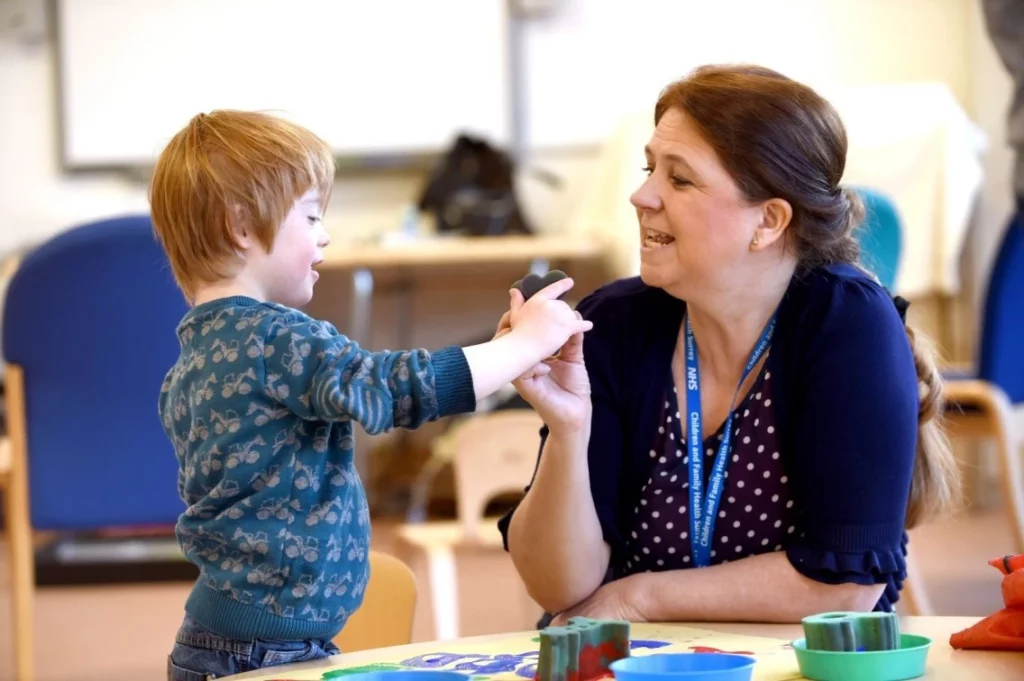Contents
Speech therapy and language therapy : unlocking your child’s potential through. In this article, we will explore the empowering benefits of speech and language therapy, including how it enhances communication skills, unleashes hidden potential, and improves overall quality of life. Prepare to discover the incredible impact of speech and language therapy on your child’s development and well-being. In the following, we dive into:
- Empowering Communication Skills: Learn how speech and language therapy can empower your child with effective communication skills, boosting their confidence and social interactions.
- Unleashing Potential: Discover the key to unlocking your child’s hidden potential through speech and language therapy, enabling them to thrive academically, emotionally, and socially.
- Improved Quality of Life: Understand how speech and language therapy can enhance your child’s overall quality of life by overcoming speech impediments, improving articulation, and fostering meaningful connections with others.
Unlock Your Child’s Speech Potential: 3 Tips to Improve Their Speech
As a bonus, we have found a highly informative video titled “3 Tips to Improve Your Child’s Speech: Speech Therapist Reveals What Works” by Better Speech. This video perfectly breaks down the topic, providing expert advice and practical techniques to enhance your child’s speech skills. Gain valuable insights into effective strategies and actionable steps you can implement at home to support your child’s speech development. Unlock your child’s speech potential with this valuable content upgrade and watch the video to empower them on their journey to improved communication.
Many children face challenges in developing speech and language skills, which can hinder their ability to effectively communicate and reach their full potential.
This struggle with speech and language can lead to various consequences. Children may experience frustration, isolation, and difficulties in expressing their needs and emotions. Their academic performance, social interactions, and self-confidence may also be negatively impacted.
This blog post will provide valuable insights and solutions to unlock your child’s potential through speech and language therapy. By reading this post, you will gain:
- Understanding: Learn about the importance of speech and language development, including how it impacts overall well-being and successful communication.
- Techniques and Strategies: Discover effective techniques and strategies employed in speech and language therapy that can be implemented at home to support your child’s progress.
- Resources and Support: Find information on available resources, tools, and professional support networks that can assist you in navigating the journey of speech and language therapy for your child.
This blog post will empower you with knowledge, practical techniques, and resources to unlock your child’s potential through speech and language therapy, fostering their communication skills, confidence, and overall growth.
Unlocking Your Child’s Potential Through Speech and Language Therapy

The Importance of Speech and Language Development
- Effective communication skills are essential for your child’s social, academic, and emotional development. Speech and language therapy lays the foundation for mastering language, articulation, and expressive abilities.
- Recognizing the signs of speech and language challenges, such as difficulties in pronunciation, limited vocabulary, or trouble understanding instructions, is crucial for early intervention and effective therapy.
- Communication difficulties can hinder your child’s ability to express themselves, interact with peers, participate in school activities, and convey their needs and emotions effectively. Speech and language therapy addresses these challenges head-on.
- Consulting a speech-language pathologist (SLP) who specializes in pediatric communication disorders is the first step towards understanding your child’s unique needs and developing a tailored therapy plan.
- Parents play a vital role in their child’s progress. Engaging in therapy sessions, implementing recommended strategies at home, and fostering a supportive environment significantly contribute to successful outcomes.
Exploring Effective Speech and Language Therapy Techniques

Techniques for Speech and Language Development
Speech therapy and language therapy employ various techniques to enhance your child’s communication skills and foster their overall child development. Here are some effective strategies to consider:
- Speech Articulation Exercises: Speech articulation exercises play a fundamental role in improving speech clarity and pronunciation. These exercises target specific sounds or problem areas, helping your child develop accurate speech production. Simple activities, such as practicing specific sounds or engaging in tongue exercises, can make a significant impact on their speech development. Through guided practice and repetition, speech therapy sessions focus on refining articulation skills for clearer communication and enhanced child development.
- Language Enrichment Strategies: Language enrichment strategies are vital in expanding your child’s language skills and expressive abilities. Speech and language therapy emphasizes the importance of activities such as reading aloud, engaging in meaningful conversations, and incorporating vocabulary-building exercises. By providing opportunities for your child to practice using new words, understand contextual meanings, and express themselves effectively, language enrichment strategies promote language development and facilitate child development in various areas.
- Augmentative and Alternative Communication (AAC): For individuals with severe speech impairments or language disorders, augmentative and alternative communication (AAC) methods can be invaluable tools. AAC devices, sign language, and other visual aids enable individuals to express their thoughts, needs, and feelings effectively. Speech therapy may incorporate AAC techniques to support language development and facilitate functional communication, empowering individuals to participate actively in social interactions and child development activities.
- Social Skills Development: Speech and language therapy also addresses social skills development, recognizing that effective communication goes beyond speech and language abilities. Therapists work on developing social skills such as turn-taking, active listening, maintaining conversations, and interpreting nonverbal cues. By incorporating social skills training, speech therapy helps your child navigate social interactions successfully, fostering meaningful connections and promoting their overall child development.
- Incorporating Play-Based Learning: Play-based activities are highly effective in speech and language therapy. These engaging and interactive sessions allow children to have fun while simultaneously targeting their speech and language goals. Play-based learning can stimulate their imagination, promote language development, and enhance overall child development. Therapists use play as a tool to create a comfortable and enjoyable environment, encouraging children to communicate, practice new skills, and build confidence in their speech and language abilities.
By incorporating these techniques into speech and language therapy sessions, your child can make significant progress in their communication skills and child development journey. Speech therapy and language therapy provide tailored approaches that cater to your child’s unique needs, supporting their speech and language development while nurturing their overall child development potential.
Resources and Support for Speech and Language Therapy

Accessing Resources and Support
When it comes to supporting your child’s speech therapy and language therapy journey, accessing the right resources and support is crucial. Here are some valuable avenues to explore:
- Collaborating with Speech-Language Pathologists: Speech-language pathologists (SLPs) are highly trained professionals who specialize in evaluating and treating communication disorders. Collaborating with an SLP is essential for understanding your child’s unique speech and language needs. They can provide expert guidance, create individualized therapy plans, and offer ongoing support throughout the process. SLPs play a pivotal role in assessing your child’s progress, adjusting intervention strategies, and ensuring effective communication goals for optimal child development.
- Online Tools and Apps: The digital age has opened up a wealth of resources and interactive tools designed specifically for speech and language therapy. From speech articulation exercises to language enrichment activities, these online tools and apps provide additional practice opportunities for your child. They engage children in interactive learning experiences while targeting specific speech and language skills. Exploring these resources can supplement the therapy sessions and enhance your child’s progress in a fun and engaging manner.
- Support Groups and Communities: Connecting with other parents facing similar challenges in speech therapy and language therapy can be immensely beneficial. Support groups and online communities offer a platform for sharing experiences, exchanging advice, and finding emotional support. These communities provide a safe space to discuss concerns, celebrate milestones, and gain valuable insights from others who have gone through similar experiences. Engaging with these support networks can provide a sense of belonging and empower you with knowledge and encouragement throughout your child’s therapy journey.
- Advocating for Your Child: As a parent, you are your child’s most powerful advocate. It is essential to understand your rights and responsibilities in advocating for your child’s speech and language needs within educational settings. Familiarize yourself with the individualized education plan (IEP) process, which outlines the necessary accommodations, support, and services your child is entitled to receive. Effective advocacy ensures that your child’s communication goals are addressed appropriately, leading to improved speech and language development and overall child development.
- Monitoring Progress and Celebrating Achievements: Regularly monitoring your child’s progress is key to ensuring the effectiveness of speech therapy and language therapy interventions. Work closely with the speech-language pathologist to evaluate your child’s advancements, address any challenges, and adjust the therapy plan accordingly. Celebrating milestones, no matter how small, boosts your child’s motivation, self-esteem, and overall confidence in their speech and language skills. Recognizing their achievements reinforces their hard work and encourages them to continue striving for further progress.
By accessing these resources and support systems, you can optimize your child’s speech therapy and language therapy experience. Remember, seeking collaboration with professionals, utilizing online tools, engaging in support networks, advocating for your child, and monitoring their progress are all integral parts of supporting their speech and language development and promoting positive child development outcomes.

In conclusion, this post has highlighted the transformative power of speech and language therapy in unlocking your child’s potential. Throughout the article, we have explored several key points:
- Firstly, we emphasized the importance of speech and language development, as it forms the building blocks for effective communication and impacts various aspects of your child’s life, including academics, social interactions, and emotional well-being.
- Secondly, we discussed the significance of early identification and intervention in addressing speech and language challenges. By recognizing the signs and seeking professional evaluation, parents can take proactive steps towards providing their child with the support they need.
- Thirdly, we delved into effective speech and language therapy techniques, such as articulation exercises, language enrichment strategies, and social skills development. These techniques offer practical ways to nurture your child’s communication skills and foster their growth.
- By the end of this post, you should have gained a deeper understanding of the importance of speech and language therapy in unlocking your child’s potential. You should be equipped with knowledge about identifying speech and language challenges, implementing effective techniques at home, and accessing resources and support for your child’s therapy journey.
Remember, with your dedication and the guidance of speech-language pathologists, you can empower your child to overcome communication obstacles and thrive in their personal, academic, and social lives. Start the journey of unlocking your child’s potential through speech and language therapy today.
If you’re eager to dive deeper into the topic of speech therapy and its significance for your child, I highly recommend reading the article “Speech Therapy And Why it is Essential For Your Child” by Skill Point Therapy. This insightful piece provides a comprehensive breakdown of the topic, offering valuable insights, expert perspectives, and practical advice.
Before we conclude, if you’re interested in further empowering your child’s educational journey, I invite you to explore the article “Individualized Education Plan Process: Empowering Parents With 03 Amazing Steps For Your Child’s Success” on our blog. This insightful piece provides valuable information on the individualized education plan (IEP) process, empowering parents with three essential steps to ensure your child’s success.